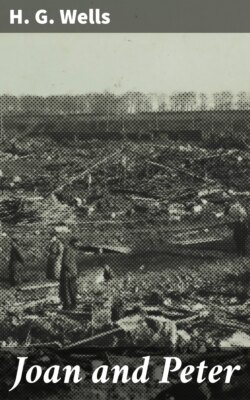Читать книгу Joan and Peter - H. G. Wells - Страница 28
На сайте Литреса книга снята с продажи.
§ 3
ОглавлениеTable of Contents
The theory of Ideals played almost as important a part in the early philosophy of Peter as it did in the philosophy of Plato. But Peter did not call them “Ideals,” he called them “toys.” Toys were the simplified essences of things, pure, perfect and manageable; Real Things were troublesome, uncontrollable, over complicated and largely irrelevant. A Real Train, for example, was a poor, big, clumsy, limited thing that was obliged to go to Red Hill or Croydon or London, that was full of stuffy unnecessary strangers, usually sitting firmly in the window seats, that you could do nothing satisfactory with at all. A Toy Train was your very own; it took you wherever you wanted, to Fairyland or Russia or anywhere, at whatever pace you chose. Then there was a beautiful rag doll named “Pleeceman,” who had a comic, almost luminous red nose, and smiled perpetually; you could hit Joan with him and make her squawk and yet be sure of not hurting her within the meaning of the law; how inferior was the great formless lump of a thing, with a pale uneventful visitor’s sort of face we saw out of the train at Caterham! Nobody could have lifted him by a leg and waved him about; and if you had shied him into a corner, instead of all going just anyhow and still smiling, he would probably have been cross and revengeful. How inferior again was the Real Cow, with its chewing habits, its threatening stare and moo and its essential rudeness, to Suzannah, the cow on the green board. Perhaps the best real things in the world were young pigs....
But this much is simply to explain how it was that Peter was grateful but not overwhelmed to find that there was also a real Nobby in existence as well as his beloved fetish. And this Nobby was, as real things went, much better than one could have expected him to be. Peter’s heart went out to him from the very first encounter, and never found reason to relinquish him again.
Nobby wasted a good lot of time that might have been better employed in play, by talking to Mummy; and when a little boy set himself to rescue his friend from so tepid an occupation, Mary showed a peculiar disposition to thwart one. “Oh! leave them alone,” she said, with the tart note in her voice. “I’m sure they don’t want either of you.”
Still Mummy didn’t always get Nobby, and a little boy and girl could hear him talk and play about with him. When he told really truly things it was better than any one else telling stories. He had had all sorts of experiences; he had been a sailor; he knew what was inside a ship. That had been a growing need in Peter’s life. All Peter’s ships had been solid hitherto. And Nobby had been in the same field, practically speaking, with lions ever so many times. Lions, of course, are not nearly so dreadful as bears in a little boy’s world; bears are the most dreadful things in the world (especially is this true of the black, under-bed bear, Ursus Pedivorus) but lions are dreadful enough. If one saw one in a field one would instantly get back over the stile again and go home, Mary or no Mary. But one day near Nairobi, Nobby had come upon a lion in broad daylight right in the middle of the path. Nobby had nothing but a stick. “I was in a hurry and I felt annoyed,” said Nobby. “So I just walked towards him and waved my stick at him, and shouted to him to get out of my way.”
“Yes?” breathless.
“And he went. Most lions will get away from a man if they can. Not always though.”
A pause. There was evidently another story to that. “Tell us,” said Mummy, more interested even than the children.
Big Nobby made model African villages out of twigs and suchlike nothings in the garden, and he brought down Joan and Peter boxes of Zulu warriors from London to inhabit them. Also he bought two boxes of “Egyptian camel corps.” One wet day he “made Africa” on the nursery floor. He made mountains out of books and wood blocks, and put a gold-mine of gold paper therein; he got in a lot of twigs of box from the garden and made the most lovely forest you can imagine; he built villages of bricks for the Zulus; he put out the animals of Peter’s Noah’s ark in the woods. “Here’s the lion,” he said, propping up the lion against the tree because of its broken leg.
“Gurr Woooooah!” said Joan.
“Exactly,” said Nobby, encouraging her.
“Waar-oooh. Waaaa!” said Joan, presuming on it.
“Bang!” said Peter. “You’re dead, Joan,” and stopped any more of that.
